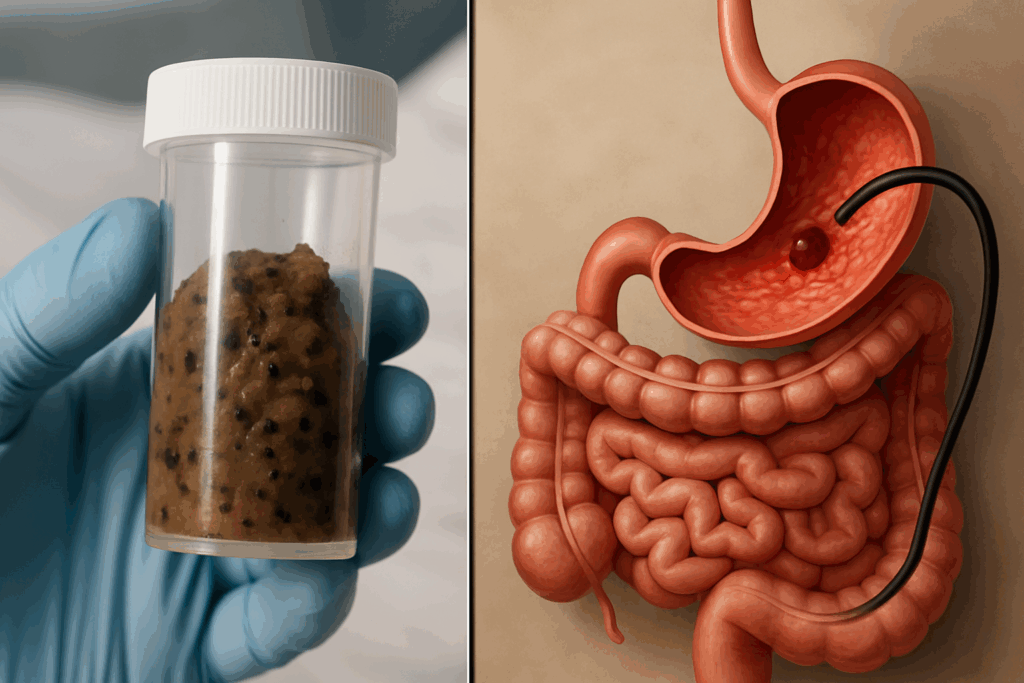Black spots in stool can be alarming, but they are not always a sign of something serious. In many cases, the cause is completely harmless, though there are situations where they could indicate internal bleeding or other medical conditions. Understanding the difference is important so you can take the right steps.
What Causes Black Specks in Stool?
1. Harmless Dietary Causes
Eating certain dark-coloured foods can result in the appearance of black specks in your stool. Common examples include blackberries, blueberries, poppy seeds, and dark leafy vegetables. Foods containing dark dyes or pigments can also pass through the digestive system without being fully broken down. Iron supplements and bismuth-containing medications, such as Pepto-Bismol, are also known to darken the stool and cause black flecks.
2. Gastrointestinal Bleeding
One of the more serious causes of black spots in stool is bleeding from the upper digestive tract. When blood is digested, it can turn stool black and sticky. This condition is known as melena and may be caused by stomach ulcers, gastritis, oesophageal varices, or even stomach cancer. The black specks may appear along with tarry texture and a distinct foul odour. If this type of bleeding is present, it usually requires urgent medical attention.
3. Parasitic Infections
Certain parasites, such as hookworms or Giardia, can irritate the intestinal lining, causing minor internal bleeding or the presence of parasite eggs. These may appear in stool as black specks. Parasitic infections often come with other symptoms including diarrhoea, fatigue, bloating, or weight loss.
4. Constipation or Hard Stools
When stool is hard or dry, it may cause small tears in the rectum or anal canal during bowel movements. This can result in tiny blood clots that may look like black dots in the stool. These are usually minor, but if the problem is ongoing or painful, a doctor should be consulted.
Accompanying Symptoms to Watch For
If black specks are the only symptom and you have recently consumed iron supplements or dark foods, the cause is likely benign. However, seek medical attention if any of the following symptoms occur alongside black spots in stool:
Fatigue or weakness
Dizziness or fainting
Stomach or abdominal pain
Tarry or sticky texture in stool
Unexplained weight loss
Nausea or vomiting, particularly if it resembles coffee grounds
Visible blood or a foul smell in stool
These may indicate internal bleeding or another serious digestive issue that should be promptly addressed.
When to See a Doctor
You should consult a doctor immediately if the black specks:
Persist for more than a couple of days
Appear without any dietary explanation
Are accompanied by any of the symptoms listed above
Come and go without a clear pattern
A healthcare provider may perform several diagnostic tests, including a fecal occult blood test, endoscopy, or colonoscopy, depending on the suspected source of the bleeding or symptoms.
Diagnosis and Treatment
Diagnosis begins with a detailed medical history and physical exam. A stool sample may be tested for hidden blood. In some cases, an endoscopic procedure is needed to view the stomach and intestines. Treatment depends on the cause. For example:
If caused by diet or medication, the appearance of black specks typically resolves on its own
If related to ulcers, treatment may include acid blockers or antibiotics
If a bleeding site is found, it may be cauterised or clipped during endoscopy
If a parasite is found, antiparasitic medication may be prescribed
Surgery may be needed in rare cases involving tumours or ongoing gastrointestinal bleeding
Conclusion
Black spots in stool are often harmless, especially when linked to food or supplements. However, they can also be an early sign of more serious health issues. If you are unsure of the cause or experience any other concerning symptoms, do not ignore them. Early diagnosis and treatment can make a significant difference.

